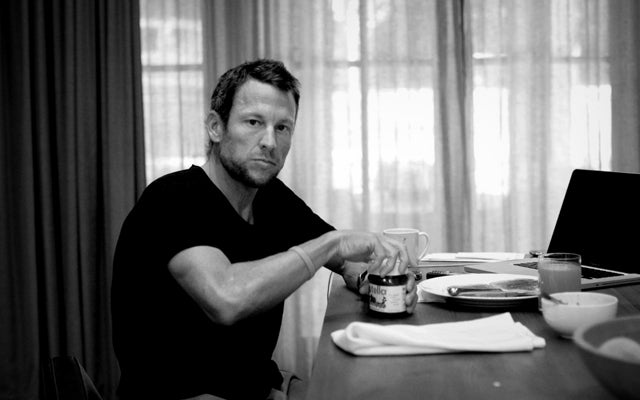No, Lance Armstrong really won’t be racing at the Ironman World Championship in Kona, Hawaii, this October 13. That’s the word from World Triathlon Corporation (WTC) CEO Andrew Messick as of Friday night.
After canceling a press conference scheduled for Friday morning, Messick and other WTC officials took the rest of the day to figure out whether there was any way out of the situation they’d found themselves in after the U.S. Anti-Doping Agency (USADA) formally (PDF) Lance Armstrong with drug violations dating back to his Tour de France days. According to WTC’s (PDF), athletes must be suspended from competition while charges are pending.
Messick had two choices: He could either change the rule and allow Armstrong to compete, which would draw outrage from other triathletes and Armstrong’s detractors; or he could stick to his guns and jeopardize WTC’S signed contracts with Armstrong’s cancer charity, Livestrong, and with NBC to televise the Ironman World Championship. Ultimately, he chose the latter.
“We certainly followed a clear and unambiguous rule,” Messick said. “None of us liked the fact that we had to do it, but the company concluded that the right thing to do is to follow the rules. Even if there’s debate about the applicability of that rule, we had an obligation to the athletes to follow it.”
To be clear, Messick, who oversaw cycling’s Tour of California before he took the top job at WTC in June 2011, is no fan of the so-called “open-investigation” rule, which broadly presumes that an athlete is guilty until proven innocent.
“The rule doesn’t stipulate whether [the charges are related to] a sport other than triathlon,” says Messick. “The rule doesn’t stipulate whether the investigation is due to a failed drug test or an investigation into a non-analytic positive [like witness testimony]. And the rule doesn’t stipulate about when the infractions allegedly occurred.”
Indeed, while Messick was running the Tour of California, he . He said that rule was unfair to cyclists who could spend a year under investigation without the opportunity to defend themselves.
“The open investigation rule allowed for athletes to potentially get stuck in limbo forever,” Messick says, regarding the Tour of California. So he got rid of it with the help of Travis Tygart, the CEO of USADA, the organization that’s now pursuing Armstrong. “Travis was the strongest voice saying ‘This is a bad rule.’”
In early 2012, Messick had the same conversation with Tygart in regards to triathlon. But by then, Armstrong, who was still under federal investigation for doping, had already expressed his interest in Ironman. Even then, a rule change would have appeared aimed at letting him race in the event that USADA brought charges.
WHAT’S AT RISK
Officials from Ironman announced their partnership with Armstrong on February 10, one week after him in connection with the same alleged doping that USADA is now focused on. WTC announced that it would auction off four entry slots at the Ironman World Championship in 2012 and 2013 with proceeds going to Livestrong. In return, Armstrong would raise the profile of Ironman by racing in at least six half- and full-distance events in 2012.
The organization undoubtedly waited to make sure that Armstrong was in the clear before announcing the partnership and was aware that USADA could still go after him, but they didn’t think that would happen before October. Messick says WTC doesn’t know what will happen to the company’s agreement with Livestrong, but he believes the NBC deal is still a go. The network has broadcast the event every year since 1990 but typically airs its coverage two months after the race and limits the show to 90 minutes. This year, to air a two-hour special just two weeks after the event, with emphasis on Armstrong. The financial details of the arrangement were not disclosed, though Messick says WTC made the agreement with NBC independent of Armstrong.
THE LAST TIME THIS HAPPENED
In 2010, WTC ignored an opportunity to change its open investigation policy for Michi Weiss, a former pro mountain biker from Austria who’d competed in the 2004 Olympics. His case is strikingly similar to Armstrong’s.
Weiss, who won an Ironman race in Saint George, Utah, in May 2010, was preparing for the Ironman World Championship that summer when NADA, the Austrian anti-doping agency, announced that it was investigating claims that he’d used drugs while mountain biking as far back as 2005. When WTC found out about the investigation, it suspended Weiss. Then, less than two weeks before Kona, NADA dropped all charges and he was free to race—although in late 2011 NADA’s independent arbitration committee reopened the case and found . Weiss still denies any wrongdoing.
As with Armstrong, the case against Weiss was built by a national anti-doping agency and relied upon the strength of verbal accusations from other cyclists. But unlike that earlier case, it’s highly doubtful that USADA will drop the charges and allow Armstrong to race at Kona. They’ve been after him for too long, now, and collected too much evidence, much of it thanks to the aborted federal investigation.
Last week, when USADA announced its charges, Armstrong was already in Nice, France, preparing for his first full-distance Ironman, which takes place in the Mediterranean resort town on June 24. He’d competed in five half-distance events before the ban, and he’d won two of them.


